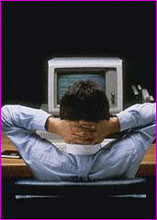
|
 |
|
by Cory Johnson Freddie's Sandwich Shop, on a sleepy corner of San Francisco's North Beach neighborhood, is an unlikely epicenter in the world of online trading. But I know of no other place that better illustrates the degree to which the trading of stocks on the Internet has altered our world. Freddie's is a tiny deli in a residential neighborhood, a 10-minute walk from the financial district in one direction, Fisherman's Wharf in the other. You could pass the place a dozen times before you noticed it. Its only sign is a perfunctory "Freddie's" logo painted on the front window. Fewer than a dozen people can cram into Freddie's at a time, and at lunchtime, they do. His sandwiches, you see, are neighborhood classics. Hungry fans descend on the shop midday, double-parking their pick-up trucks and BMWs on the street outside. Behind the deli counter, Eddy Sweileh, his wife Rosalia, and two helpers crank out the coveted sandwiches one at a time. Sweileh, of Lebanese and Jordanian decent, is in his early 40s, just short of six feet tall. He's quiet and hard-working. A few chairs and a bench outside are as desired as his sandwiches: When the rest of the city is soaked with fog, the sun somehow still seems to shine over this urban hamlet. Freddie's might be a world away from daytrading. Yet there are clues to its status as an embodiment of online trading. The old Zenith next to the deli is not tuned to a soccer match but rather to CNBC with its tell-tale ticker framing the bottom of the screen. Sweileh is cordial with his regular customers, but not to the point of distraction. At all times, he keeps one eye on the cash register, the other on CNBC. To most, he's just Eddy-the-sandwich-guy—they already feel in-the-know if they avoid calling him "Freddie." But few of his customers know Sweileh as the fervent online trader that he is.
Sweileh is not the only one watching the tape. As the line slowly moves forward, a handful of 30-somethings in chinos and open-collared shirts eye the screen as they talk about interoffice politics or ski weekends in Lake Tahoe. Then the CNET symbol scrolls across. Conversation stops. "Whoa, another dollar and I won't be underwater," says one, to a laugh. Freddie's has always been a business of regulars. Once it was the second generation Italian-Americans for whom North Beach is so well known: The late mayor Joe Alioto stopped by regularly for his Italian combo—pepperoncini and mustard, no tomato, no mayonnaise, no lettuce. But now Dotcom-ers dominate the crowd. CNET headquarters lies just down the hill, and at Freddie's a group of them gathers each day for lunch. Like Sweileh, many of them dabble in online trading. And the rest of them have their heretofore unimaginable personal fortunes tied up in CNET stock - just the type of stock Sweileh trades.
Such amateur online trading has swept the nation. Ten years ago it was inconceivable, but as the 1990s drew to a close, online brokerage accounts had grown to more than 23.1 million, according to a recent report by Credit Suisse First Boston. The same study said the major online brokerages—led by Schwab, Fidelity, TD Waterhouse, Quick & Reilly, Etrade, and Ameritrade—now hold some $1.3 trillion in customer assets. As new online traders have flocked to the market, they have shown themselves eager for new stocks to trade. Investment banks have been more than happy to fill that need, bringing new companies public by the dozen. And through trial and some error, they've found that these new traders covet one type of stock above all others—the Internet stock. The growth of Internet initial public offerings, or IPOs, has closely followed that of online trading. E*Trade, for example, had 485,000 accounts at the end of the fourth quarter of 1998. That same quarter saw 10 Internet IPOs. Nine months later, E*Trade had some 1,200,000 accounts, and the market saw 67 third-quarter Internet IPOs.
The impact of these online traders on the markets has been felt widely, if not deeply. Such sometime traders have made a volatile market even more volatile, and professional traders say they have had to be on the lookout for stocks that suddenly start to move, fueled by the actions of these newcomers. Continue: The real daytraders The Formula That Shook The World | Impact of Online Trading A Trader's Lexicon | Play a Virtual Market | Resources Transcript | Site Map | Trillion Dollar Bet Home Editor's Picks | Previous Sites | Join Us/E-mail | TV/Web Schedule About NOVA | Teachers | Site Map | Shop | Jobs | Search | To print PBS Online | NOVA Online | WGBH © | Updated November 2000 |

 If you think sandwiches and stocks don't have much in
common, just ask Eddy Sweileh.
If you think sandwiches and stocks don't have much in
common, just ask Eddy Sweileh.
 Eddy-the-sandwich-guy is not alone in his passion for
trading stocks over the Internet. Over 23 million
Americans have caught the bug.
Eddy-the-sandwich-guy is not alone in his passion for
trading stocks over the Internet. Over 23 million
Americans have caught the bug.

